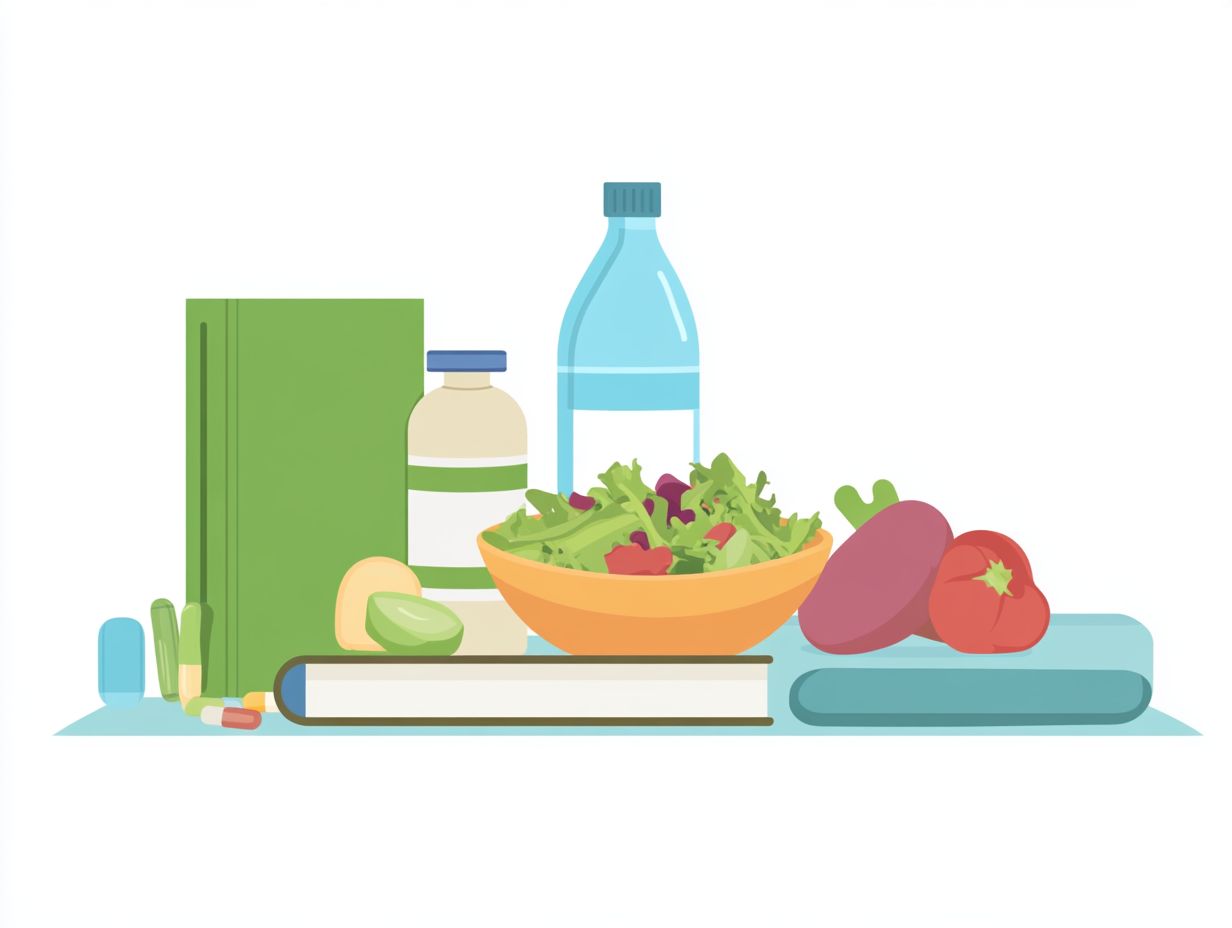Cancer prevention involves a proactive approach to health and lifestyle choices. By incorporating essential resources and healthy foods, individuals can significantly reduce their risk of developing cancer. Here are five fundamental resources for cancer prevention:
- Healthy Diet and Nutrition: A diet rich in fruits, vegetables, whole grains, and antioxidants reduces cancer risk and supports overall health by combating inflammation and oxidative stress. Incorporating healthy eating habits, such as the Mediterranean diet, can further enhance these benefits.
- Regular Physical Activity: Engaging in aerobic exercises, strength training, and flexibility workouts helps reduce the risk of chronic diseases, including cancer, while improving physical and emotional well-being.
- Avoiding Harmful Substances: Steering clear of tobacco, secondhand smoke, and excessive alcohol intake is crucial for lowering cancer risk and maintaining a healthy lifestyle.
- Early Detection and Screening: Regular screenings and self-exams are vital for early cancer detection, allowing for timely intervention and better treatment outcomes.
- Emotional Support and Mental Health: Strong emotional support systems and stress reduction practices encourage healthier habits and bolster the immune system, contributing to cancer prevention.
Implementing these resources into daily life can help individuals maintain their health and reduce the risk of cancer. For additional information and support, consider accessing resources from organizations such as the American Cancer Society and the National Cancer Institute. Additionally, Mayo Clinic provides valuable health information and dietary advice on cancer prevention strategies.
Key Takeaways:
1. Healthy Diet and Nutrition

A healthy diet and nutrition reduce cancer risk by focusing on fruits, vegetables, whole grains, and antioxidants, aligning with the principles of the Mediterranean diet.
|||
A healthy diet and nutrition reduce cancer risk by focusing on fruits, vegetables, whole grains, and antioxidants, aligning with the principles of the Mediterranean diet. Following nutritional guidelines and making conscious dietary changes can significantly impact cancer-related outcomes.
A healthy diet and nutrition reduce cancer risk by focusing on fruits, vegetables, whole grains, and antioxidants, aligning with the principles of the Mediterranean diet.
Healthy diet emphasizes minimizing processed foods and includes whole foods like legumes and nuts to support immune function and overall health.
Maintaining a balanced diet helps combat inflammation and oxidative stress, both contributors to cancer development.
2. Regular Physical Activity
Regular physical activity reduces the risk of chronic diseases, including breast and lung cancer, and improves overall well-being.
|||
Regular physical activity reduces the risk of chronic diseases, including breast and lung cancer, and improves overall well-being. Following exercise recommendations, such as including a variety of physical activities, supports maintaining a healthy weight and overall health.
Regular physical activity reduces the risk of chronic diseases, including breast and lung cancer, and improves overall well-being.
Engaging in aerobic activities, strength training, and flexibility workouts enhances physical fitness and emotional health.
Aerobic exercises, such as walking or swimming, improve heart health and help maintain a healthy weight. Strength training boosts muscle and bone health. Flexibility workouts like yoga reduce stress.
Integrating simple activities, like taking stairs instead of elevators and scheduling short exercise breaks, promotes an active lifestyle.
3. Avoiding Harmful Substances
Avoiding harmful substances like tobacco, secondhand smoke, and excessive alcohol is essential for cancer prevention.
Tobacco use and secondhand smoke increase the risk of lung cancer and other chronic diseases.
Moderating alcohol intake and choosing healthier lifestyle options reduce cancer risks.
4. Early Detection and Screening
Early detection and screening in cancer prevention involve identifying cancer at its earliest stages through procedures like mammograms and colonoscopies.
Early detection enables timely intervention and improves treatment outcomes.
Screening is recommended for those with a family history of cancer or who reach specific age thresholds.
Self-exams, such as breast or skin checks, help individuals monitor changes in their bodies.
5. Emotional Support and Mental Health

Emotional support and mental health play crucial roles in cancer prevention by influencing stress levels and lifestyle choices.
Emotional support encourages healthier habits like balanced nutrition and regular exercise, contributing to a stronger immune system.
Stress reduction practices, such as mindfulness, can enhance emotional well-being.
Access to healthcare professionals and support groups provides essential resources and community support.
What Are the Key Risk Factors for Cancer?
Key risk factors for cancer include tobacco use, viral infections like HPV, family history, unhealthy diet, and physical inactivity.
Modifiable factors such as smoking and diet changes can reduce cancer risk.
HPV infection is a major risk factor for cervical cancer.
Regular exercise reduces risks for types like lung and prostate cancer.
How Can a Healthy Diet Help Prevent Cancer?
A healthy diet can help prevent cancer by providing essential nutrients and antioxidants that reduce oxidative stress and inflammation.
|||
A healthy diet can help prevent cancer by providing essential nutrients and antioxidants that reduce oxidative stress and inflammation. Incorporating more fruits, vegetables, and whole grains into dietary habits is a key strategy in cancer prevention.
A healthy diet can help prevent cancer by providing essential nutrients and antioxidants that reduce oxidative stress and inflammation.
Consuming fruits, vegetables, and whole grains supports immune function and cellular repair, which are crucial in cancer prevention.
Whole, unprocessed foods enhance overall well-being and play a role in reducing cancer risk.
What Types of Physical Activity Can Help Reduce the Risk of Cancer?
Types of physical activity that can help reduce the risk of cancer include aerobic exercises, strength training, and flexibility workouts.
-
Aerobic exercises like brisk walking, cycling, and swimming improve cardiovascular health.
-
Strength training helps maintain muscle mass and supports overall fitness.
-
Flexibility workouts like yoga enhance balance and reduce injury risks.
What Harmful Substances Should Be Avoided for Cancer Prevention?

Avoiding harmful substances like tobacco, secondhand smoke, and excessive alcohol is crucial for cancer prevention.
|||
Avoiding harmful substances like tobacco, secondhand smoke, and excessive alcohol is crucial for cancer prevention. These risk behaviors are preventable causes of many cancer types, including lung and liver cancer.
Avoiding harmful substances like tobacco, secondhand smoke, and excessive alcohol is crucial for cancer prevention.
Tobacco use, secondhand smoke, and heavy alcohol intake increase the risk of cancers such as lung, throat, and liver.
Prevention includes avoiding tobacco, minimizing exposure to secondhand smoke, and limiting alcohol consumption.
Why Is Early Detection and Screening Important for Cancer Prevention?
Early detection and screening are important for cancer prevention because they help identify cancer at its most treatable stages, improving survival rates and outcomes.
|||
Early detection and screening are important for cancer prevention because they help identify cancer at its most treatable stages, improving survival rates and outcomes. Regular screenings and self-exams, such as for skin cancer, are essential practices in early cancer detection efforts.
Early detection and screening are important for cancer prevention because they help identify cancer at its most treatable stages, improving survival rates and outcomes.
Screenings like mammograms, colonoscopies, and Pap smears detect anomalies that are not noticeable through self-examination or symptoms.
Regular screenings increase the chances of early cancer detection, leading to more effective treatment and better prognoses.
How Can Emotional Support and Mental Health Contribute to Cancer Prevention?
Emotional support and mental health contribute to cancer prevention by encouraging health-promoting behaviors and timely medical care.
|||
Emotional support and mental health contribute to cancer prevention by encouraging health-promoting behaviors and timely medical care. Strong support systems can improve lifestyle choices and reduce stress, which are vital in reducing cancer risk.
Emotional support and mental health contribute to cancer prevention by encouraging health-promoting behaviors and timely medical care.
Strong emotional support systems, like friends and support groups, enhance mental well-being and reduce stress, which may lower cancer risk.
Maintaining mental health helps individuals confront health fears and supports healthier lifestyle choices essential for cancer prevention.
What Are Some Additional Resources for Cancer Prevention?
Additional resources for cancer prevention include websites like the American Cancer Society and the National Cancer Institute, which offer guidelines on reducing cancer risks.
|||
Additional resources for cancer prevention include websites like the American Cancer Society and the National Cancer Institute, which offer guidelines on reducing cancer risks. Educational resources such as cancer awareness campaigns and cancer education materials can be beneficial in understanding preventable causes and risk factors.
Additional resources for cancer prevention include websites like the American Cancer Society and the National Cancer Institute, which offer guidelines on reducing cancer risks.
Community support groups, local hospitals, and nonprofit organizations provide safe spaces for sharing experiences and learning prevention strategies.
Educational materials such as brochures and webinars, along with healthcare professionals, offer important information on regular screenings and preventative care.
Frequently Asked Questions

What are the 5 essential resources for cancer prevention?
The 5 essential resources for cancer prevention are a healthy diet, regular exercise, avoiding tobacco and alcohol, cancer screenings, and maintaining a healthy weight.
|||
The 5 essential resources for cancer prevention are a healthy diet, regular exercise, avoiding tobacco and alcohol, cancer screenings, and maintaining a healthy weight. Implementing these cancer prevention strategies can reduce overall cancer risk and support a healthy lifestyle.
The 5 essential resources for cancer prevention are a healthy diet, regular exercise, avoiding tobacco and alcohol, cancer screenings, and maintaining a healthy weight.
How can a healthy diet help prevent cancer?
A healthy diet can help prevent cancer by including plenty of fruits, vegetables, whole grains, and lean proteins. These foods are rich in vitamins, minerals, and antioxidants that can help protect against cancer.
Why is regular exercise important for cancer prevention?
Regular exercise can help prevent cancer by reducing inflammation, boosting the immune system, and helping to maintain a healthy weight. It can also help lower the risk of certain types of cancer, such as breast and colon cancer.
|||
Regular exercise can help prevent cancer by reducing inflammation, boosting the immune system, and helping to maintain a healthy weight. It can also help lower the risk of certain types of cancer, such as breast, colorectal, and lung cancer, contributing to a reduction in cancer-related deaths.
Regular exercise can help prevent cancer by reducing inflammation, boosting the immune system, and helping to maintain a healthy weight. It can also help lower the risk of certain types of cancer, such as breast and colon cancer.
What role do tobacco and alcohol play in cancer prevention?
Tobacco and alcohol use are major risk factors for cancer. Avoiding these harmful substances can significantly reduce the risk of developing cancer, especially lung, throat, and liver cancer.
|||
Tobacco and alcohol use are major risk factors for cancer. Avoiding these harmful substances, including secondhand smoke exposure, can significantly reduce the risk of developing cancer, especially lung, throat, and liver cancer. Understanding these risk factors helps in making informed lifestyle choices.
Tobacco and alcohol use are major risk factors for cancer. Avoiding these harmful substances can significantly reduce the risk of developing cancer, especially lung, throat, and liver cancer.
Why are cancer screenings important for prevention?
Cancer screenings can detect cancer at an early stage when it is most treatable. They can also help identify precancerous conditions, allowing for early intervention and prevention of cancer.
|||
Cancer screenings can detect cancer at an early stage when it is most treatable. They can also help identify precancerous conditions, allowing for early intervention and prevention of cancer. Regular cancer screening tests are crucial for early detection, especially for individuals with a family history of cancer.
Cancer screenings can detect cancer at an early stage when it is most treatable. They can also help identify precancerous conditions, allowing for early intervention and prevention of cancer.
How does maintaining a healthy weight contribute to cancer prevention?
Being overweight or obese increases the risk of developing several types of cancer, including breast, colon, and pancreatic cancer. Maintaining a healthy weight through a balanced diet and regular exercise can help prevent cancer.
|||
Being overweight or obese increases the risk of developing several types of cancer, including breast, colorectal, and pancreatic cancer. Maintaining a healthy weight through a balanced diet and regular exercise can help prevent cancer, supporting overall cancer prevention efforts.
Being overweight or obese increases the risk of developing several types of cancer, including breast, colon, and pancreatic cancer. Maintaining a healthy weight through a balanced diet and regular exercise can help prevent cancer.








